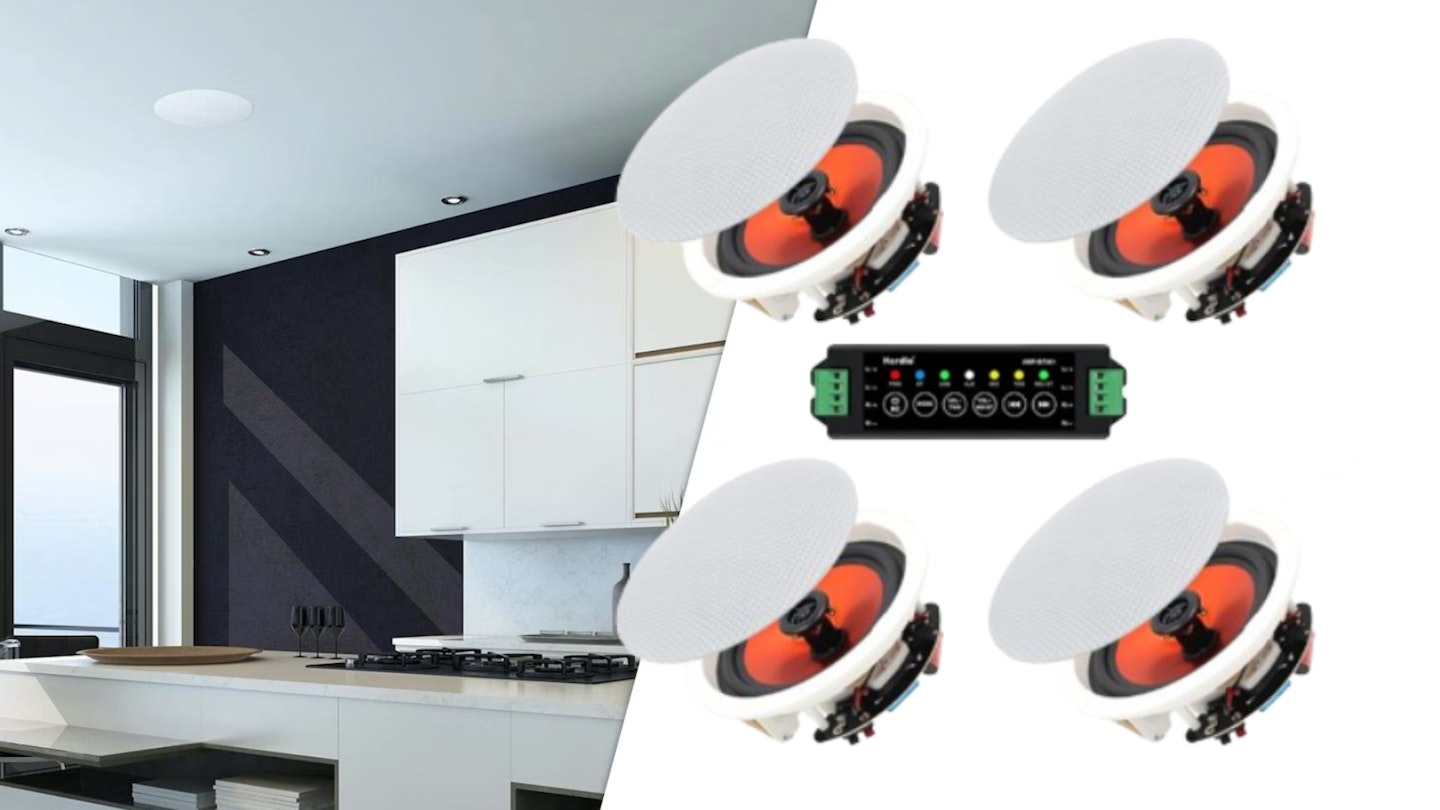No matter how high up you try to rig them, even the best speakers won't look or sound right unless they're engineered for downward-firing in-ceiling audio. Resting in a ceiling cavity, these hidden audio gems deliver overhead sound. So, if you've mounted those standard hi-fi speakers as high as you can, they still don't make the best ceiling speakers.
They may seem like a high-tech extravagance aimed at audiophiles or those with a home cinema the size of your local Cineplex. But in practice, the best ceiling speakers are affordable, easily installed and a pleasure to use. They're also affordable for anyone setting up their own business, restaurant or café – not to mention less unsightly than just plumping for some old hi-fi speakers.
Best ceiling speakers of 2024 at a glance:
• Best overall: Herdio 300 Watts – View at Amazon
• Best budget: Pyle PIC8E 2-Way In-Wall In-Ceiling – View at Amazon
• Best for bathrooms: Polk Audio RC80i – View on CyberMarket
• Best for Dolby Atmos: Q ACOUSTICS Ceiling QI65C – View at Amazon
More discreet than just relying on extra floor-standing speakers, ceiling speakers create an immersive musical experience when hooked up to your hi-fi or streaming device.
We've examined the strengths, weaknesses, and specs of our speaker picks and included a range of diameters, depending on how much power you need and what kind of footprint you want them to have in your ceiling.
The best ceiling speakers of 2024
Please note: All prices correct at time of writing. Prices, stock and deals subject to change without notice.
Best overall
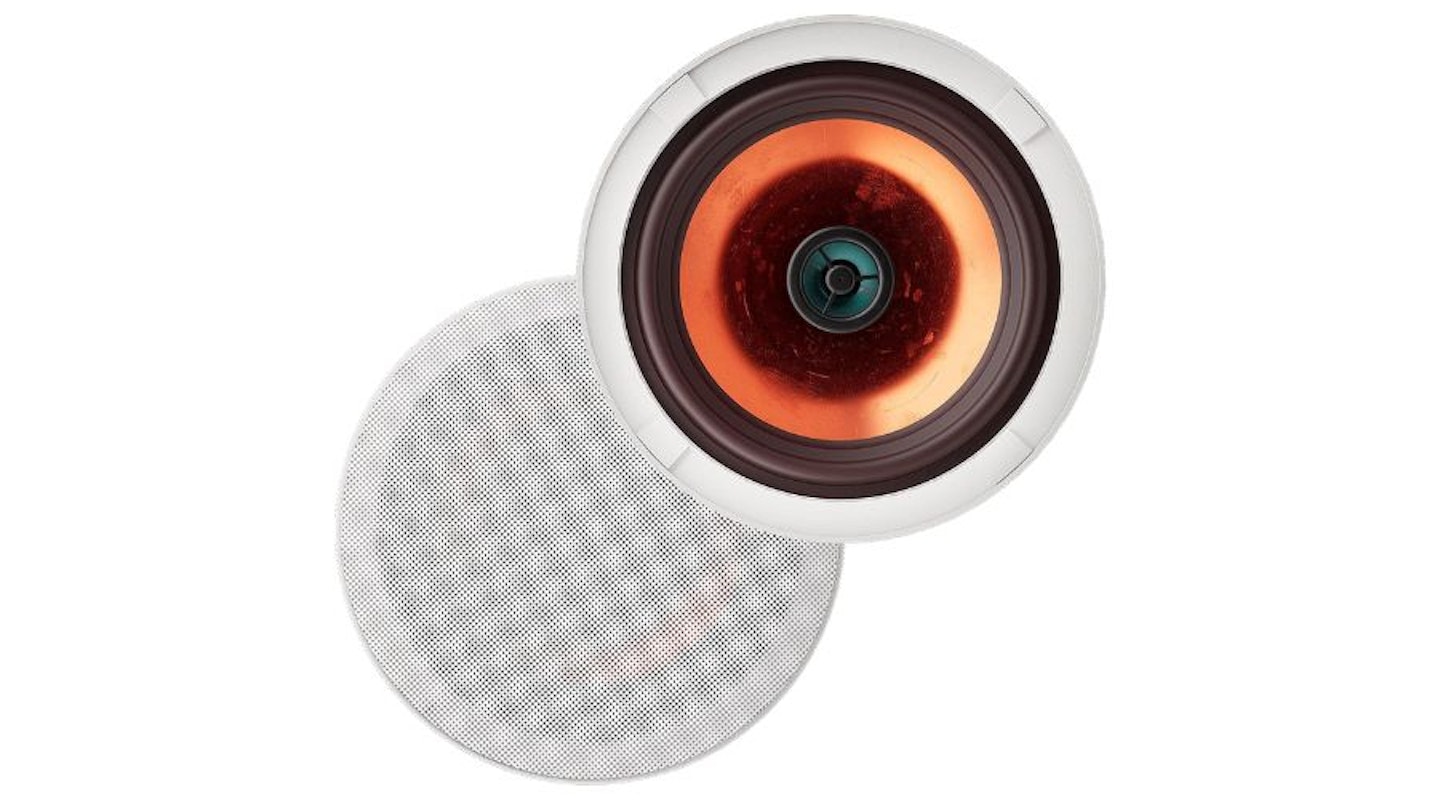 Herdio/Amazon
Herdio/AmazonHerdio's monstrous 300W ceiling speakers come in a smallish 6.5-inch speaker package, and fit easily into walls about the house, but especially well in the lounge. A particularly brilliant feature of the Herdio 300W speakers is its Bluetooth capabilities, which removes the need to purchase a costly amplifier.
As for build quality, the Herdio is solid enough for its purpose. The overall sound quality of is good, but not quite high-end enough for serious home cinema. But, for everything else, this dual speaker setup is great for immersing yourself in front of the TV – or filling your room with music from above.
Pros
- Excellent Bluetooth convenience and usability
- Solid sound with an incredible 300W total audio output
- Easy to install with sturdy fitting
Cons
- The quality is good for most uses, but not for serious home cinema
| Drivers | 1-inch soft dome tweeter, 6.5-inch poly woofer |
| Output power | 150w per channel |
| Impedance | 8 ohms |
| Frequency range | 50 Hz - 20 kHz |
| Active / Passive | Passive |
| Dimensions | 22.5 x 22.5 x 8.2 cm |
| Weight | 3.5 kg |
Best budget
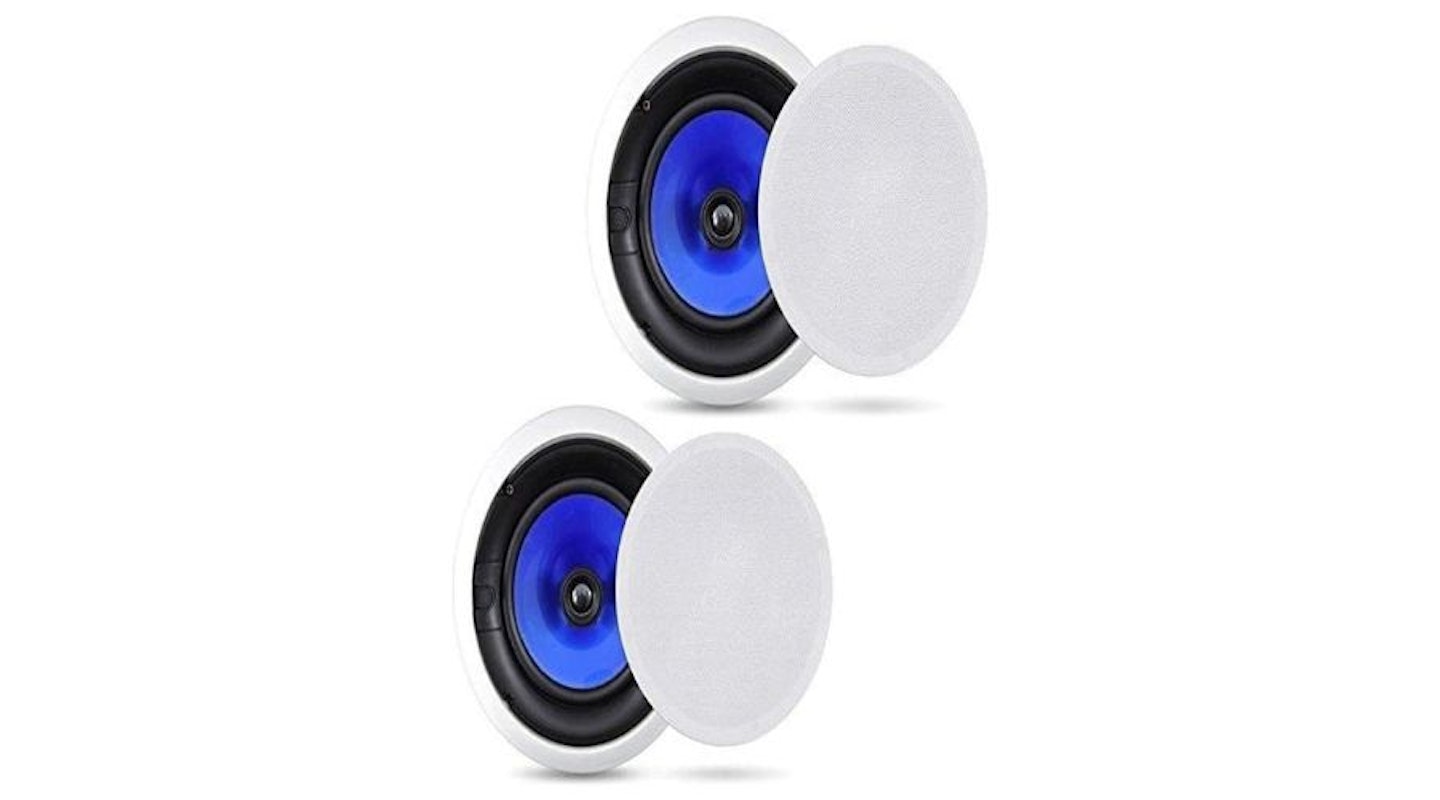 Pyle
PyleGreat sound for much less than £100 is hard to come by, but with the Pyle PIC8E ceiling speakers, there's no denying their quality – here, budget definitely doesn't mean cheap sound.
Designed to be used for a home cinema or lounge space, their easy-to-install design sits flush and securely with the ceiling itself. Alongside the respectable 250W output, for those who prefer a customised sound, the Pyle PIC8E dual speakers have treble control. So, vocals and other high frequencies can be fine-tuned to suit your taste. Best of all, the built-in mounting hardware makes installation easier than most.
Pros
- Excellent value and sound quality compared to the competition
- The 250W audio output is powerful enough for parties, movies and more
- Designed to be seamlessly mounted
Cons
- Installation instructions are a little brief for some
| Drivers | 1-inch silk dome omnidirectional tweeter, 8-inch poly cone woofer |
| Output power | 150W RMS (per channel) |
| Impedance | 8 Ohms |
| Frequency range | 50Hz to 20kHz |
| Active / Passive | Passive |
| Dimensions | 23cm x 23cm x 8cm |
| Weight | 3.5kg |
Best for bathrooms
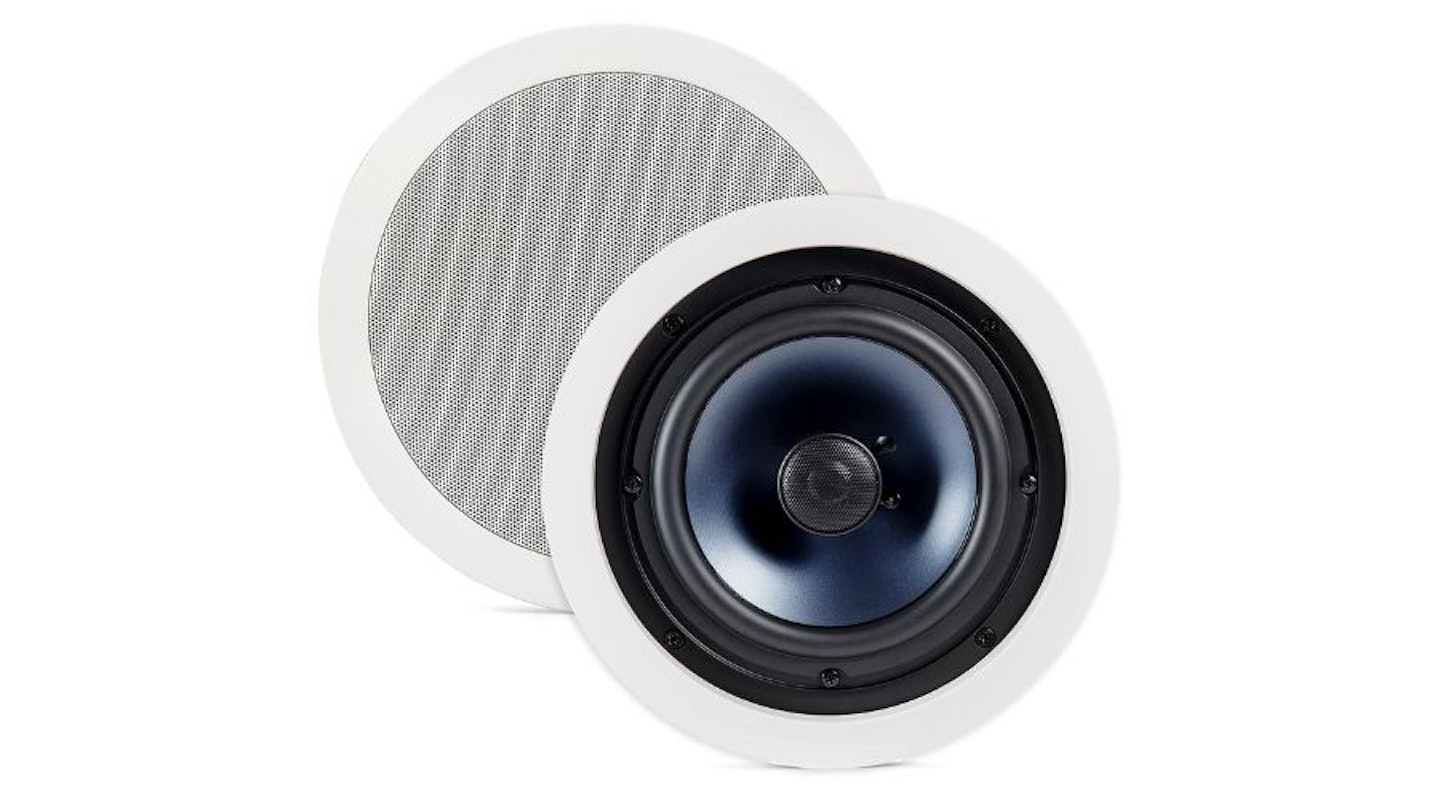 Polk
Polkwww.cybermarket.co.uk
The Polk Audio RC80i ceiling speakers pack quite a punch, both in terms of sound quality and value for money. They carry an 8-inch subwoofer and 1-inch tweeter, with 15 degrees of directional adjustment. This size, coupled with Polk Audio engineering, means that the sound quality and detail are maintained at higher volumes. But the key feature here is their suitability for bathrooms, saunas or even in sheltered outdoor areas like eaves.
Another real highlight is that Polk has matched the timbre of the speakers to its RTiA Series – a series aimed at home cinemas and premium entertainment setups, and is recognised for its accuracy and realism. These ceiling speakers should be high on any audio enthusiast’s shopping list.
Pros
- High-quality audio ideal for bathrooms, kitchens and other such areas
- Huge bass from a generous 8-inch subwoofer for more immersion
- The tweeter angle can be adjusted for even more control and realism
Cons
- If your bathroom is small, the diameter may be a little large for some
| Drivers | 1-inch metalized soft dome tweeter, 8-inch polymer-composite cone woofer |
| Output power | 20 - 100 watts per channel |
| Impedance | 8 ohms |
| Frequency range | 35Hz - 20kHz |
| Active / Passive | Passive |
| Dimensions | 273mm x 92mm |
| Weight | 1.95 Kg |
Best for Dolby Atmos
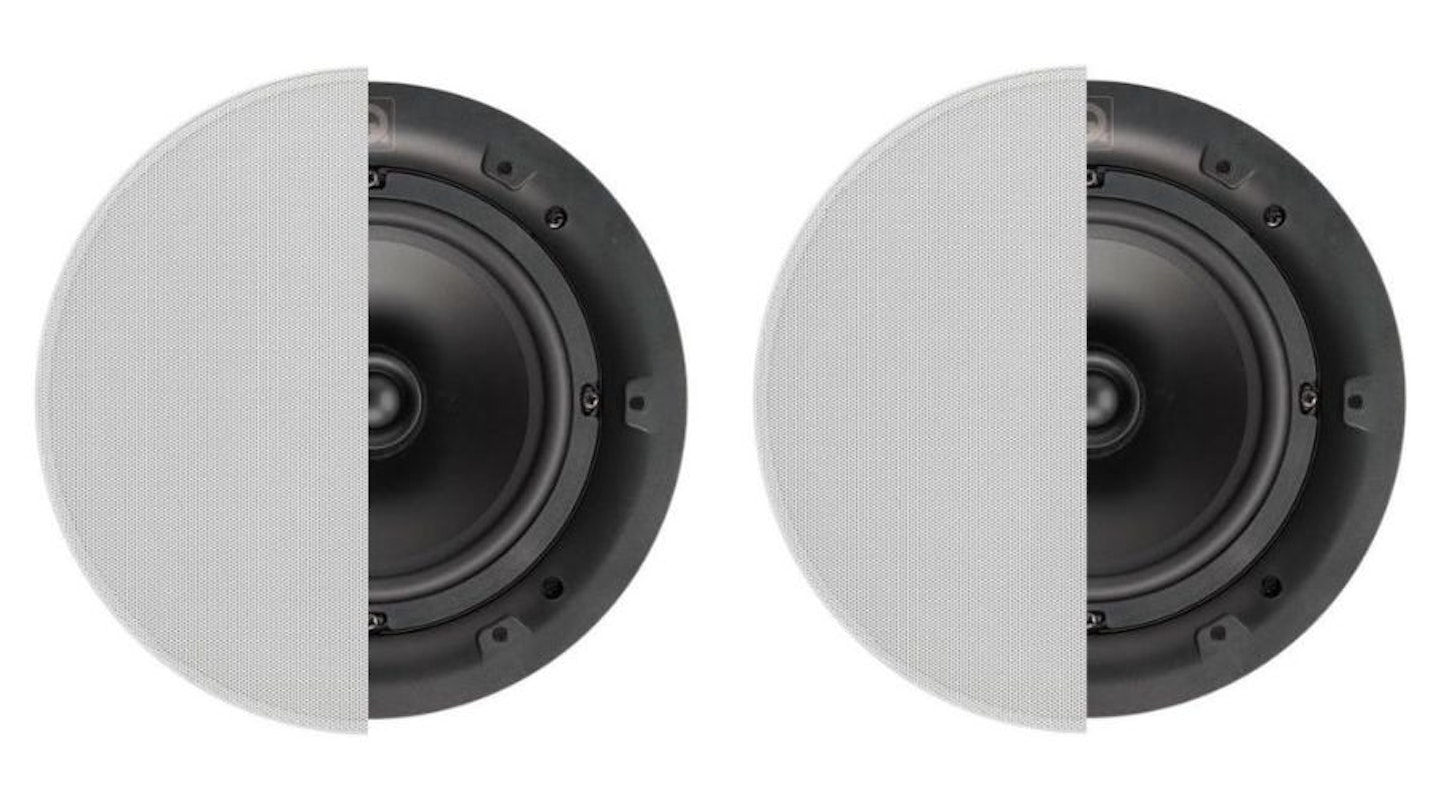 Q ACOUSTICS/Amazon
Q ACOUSTICS/AmazonThese QI65C ceiling speakers from Q Acoustics are an excellent option for anyone looking to add immersive overhead sound effects and more to their Dolby Atmos home cinema setup. They have two separate drivers – the 6.5-inch woofer and the 0.75-inch dome tweeter can deliver a full and balanced sound.
Peak power is rated at 60 watts, which is enough for the average Atmos setup. Talking of Atmos, the real bonus is the tweeter which can be moved – meaning you can aim those frequencies at your seating position for maximum effect. It’s a lot of audio know-how in a small package that you’re after, the in-ceiling mount will really project those surround sounds into the room.
Pros
- Directable tweeters for more control and realism
- Solid bass response for the price and size
- Powerful enough for most home cinema setups despite the cones only being 6.5-inch
Cons
- O-rings for a tighter seal with the ceiling would have been a nice-to-have
| Drivers | 0.75-inch dome tweeter, 6.5-inch poly cone woofer |
| Output power | 60W |
| Impedance | 8 ohms |
| Frequency range | 75Hz - 22kHz |
| Active / Passive<br> | Passive |
| Dimensions | 23 x 8 x 23 cm |
| Weight | 1 kg |
Best with built-in amp
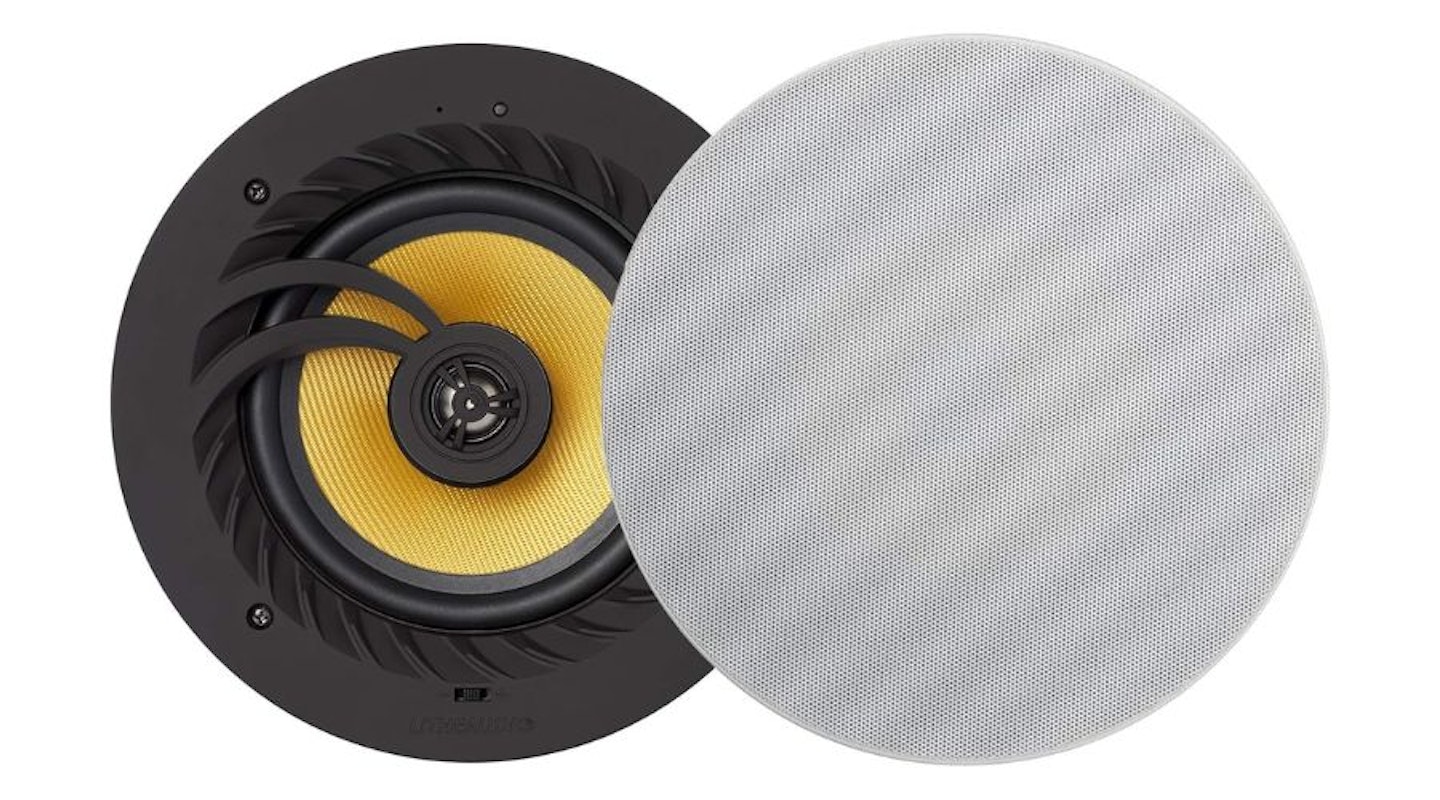 Lithe Audio/Amazon
Lithe Audio/AmazonUnlike most other options listed here, the Lithe Audio Bluetooth Ceiling Speakers are an all-in-one solution. They carry an in-built amplifier and Bluetooth receiver. This simplifies installation and daily use considerably, requiring no extra tech to operate, other than a connection to mains power. So, if you’re looking for the flexibility of being able to cast your music into the air from your music streaming service (without needing extra wires and a separate amplifier) this set from Lithe is an ideal option.
A plus for anyone looking to expand their experience is that these speakers use a master and slave configuration. This means that up to six Lithe Audio speakers can be linked to create a larger setup - but note that you're only getting one speaker at this price. Although some audio purists may be offended by ditching the separate amp and speaker wiring, the performance of these speakers remains undeniably high. The 6.5-inch subwoofer has plenty of depth, and the 1.2-inch tweeter delivers crisp details.
Your media streams over the speakers via the Bluetooth 5.0 connection, which is also compatible with Amazon Alexa and Google Assistant devices. The Lithe ceiling speakers are some of the best Bluetooth speakers on the market.
Pros
- All-in-one solution for streaming audio
- Hugely flexible and hassle-free wireless Bluetooth 5.0 connection
- Smart assistant compatible for easy control
Cons
- You'll still need an inconspicuous mains power socket
| Drivers<br> | 1.2-inch titanium tweeter, 6.5-inch Woven Kevlar Cone woofer |
| Output power<br> | 50W per channel |
| Impedance<br> | 8 ohms |
| Frequency range<br> | 55Hz-20kHz |
| Active / Passive<br> | Master - mains powered via an in-built amp. Slave - passive |
| Dimensions | 23 x 23 x 9.7 cm |
| Weight | 4.6 kg |
Best easy fitting
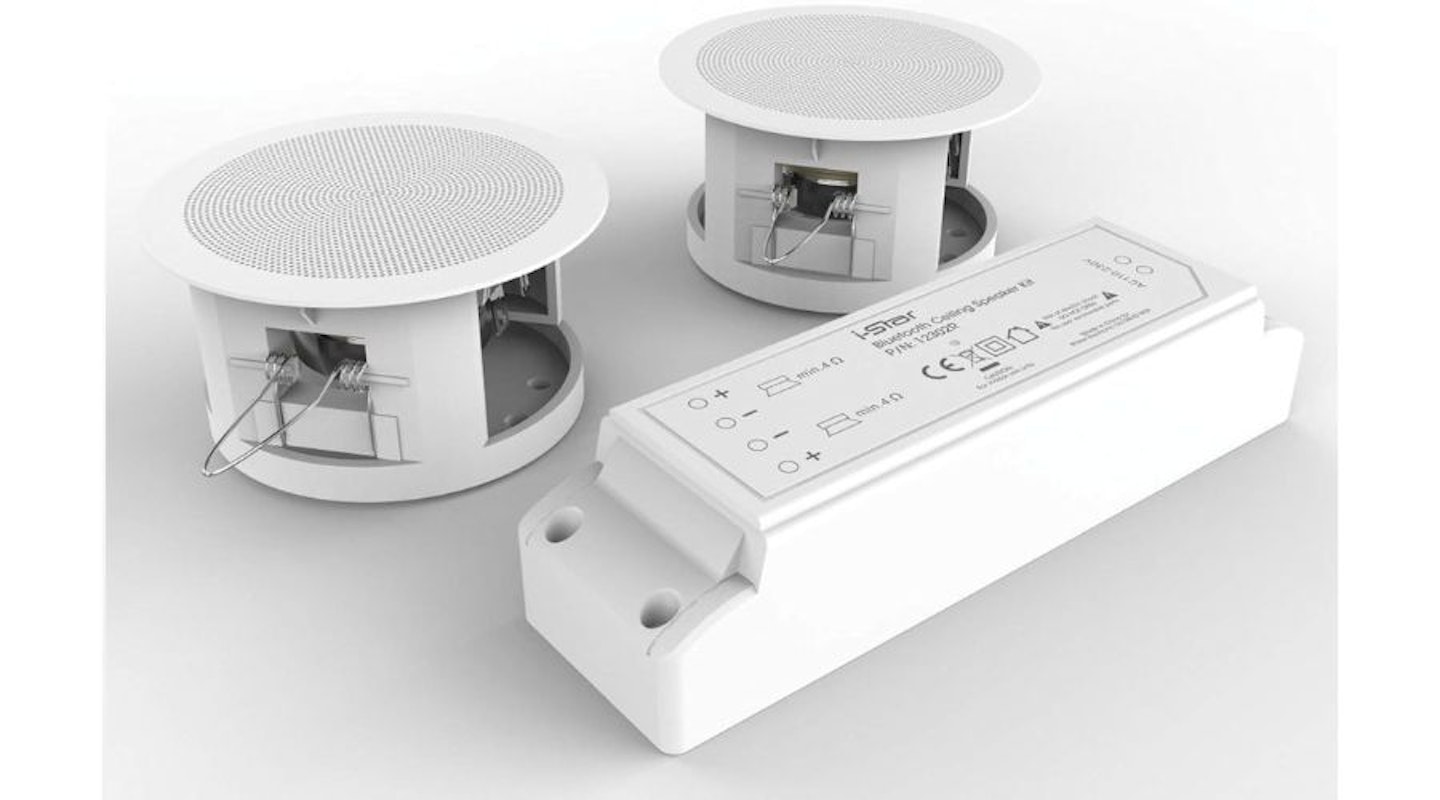 i-Star/Amazon
i-Star/AmazonThe very best thing about these i-Star ceiling speakers is the overall size and shape – as they are designed to simply slot into a standard downlighter hole. So, if you have a room with an array of halogen spotlights to choose from, simply disconnect a pair of them and slide these into place instead. Or, use a standard downlighter cutting tool and add these speakers to fit into your lighting pattern for a uniform look. Power-wise, they'll even work with the existing lighting circuit.
Even better, these are Bluetooth-enabled – so you can pair these with your smartphone or other audio device and stream your music to them with minimal hassle. At this size, as long as you don't expect thumping bass and premium hi-fi sound, they're perfect for casual listening with one of the easiest setups we've seen.
Pros
- Extremely low hassle to set up, using the existing lighting circuit and cutouts
- Discrete design that will blend in very well with you're existing lighting
- Bluetooth connectivity for simple, trouble-free streaming audio
Cons
- If you want serious hi-fi power go for larger ceiling speakers
| Drivers | 83 mm woofer |
| Output power | 2 x 6W RMS output |
| Impedance | Not specified |
| Frequency range | Not specified |
| Active / Passive | Active |
| Dimensions | 8.4 x 8.4 x 4.5 cm |
| Weight | 700 g |
Best waterproof
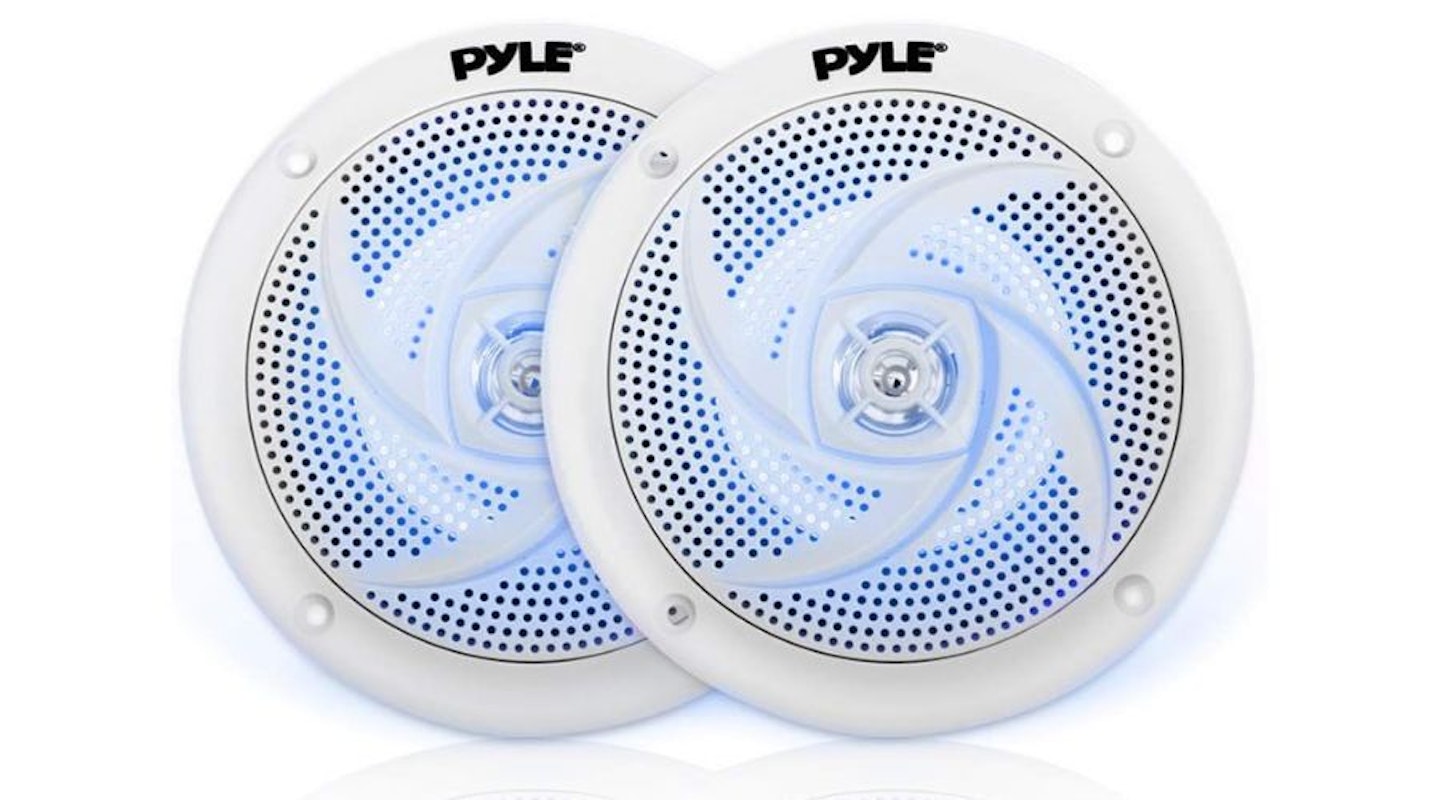 Pyle/Amazon
Pyle/AmazonIf you really want to guarantee that no amount of water can get into your ceiling speakers, these Marine Speakers from PYLE are the way to go. Suitable for everything from boats, showers, and outdoor installations, they're engineered to survive all weathers. Power-wise, they have an impressive 180 watts to play with for excellent volume.
One added benefit is a low-profile mount, so installing these in smaller spaces isn't a problem. But, our favourite feature is the integrated LED lighting - adding a high-tech glow to any room (or vehicle).
Pros
- A decent amount of output from such diminutive speakers
- Built-in LED lighting – ideal for adding a glow to your room or even a shower
- Low-profile mount means no protrusions in smaller spaces
Cons
- They aren't the best for blending in with your decor thanks to the overall design and lighting
| Drivers | 165mm (6.4-inch) Polypropylene woofer, 25.4mm (1-inch) PEI tweeter |
| Output power | 180 watts |
| Impedance | 4 Ohms |
| Frequency range | 50Hz to 20kHz |
| Active / Passive | Passive |
| Dimensions | 180 x 102 x 76 mm |
| Weight | 1.36 kg |
Best for two rooms
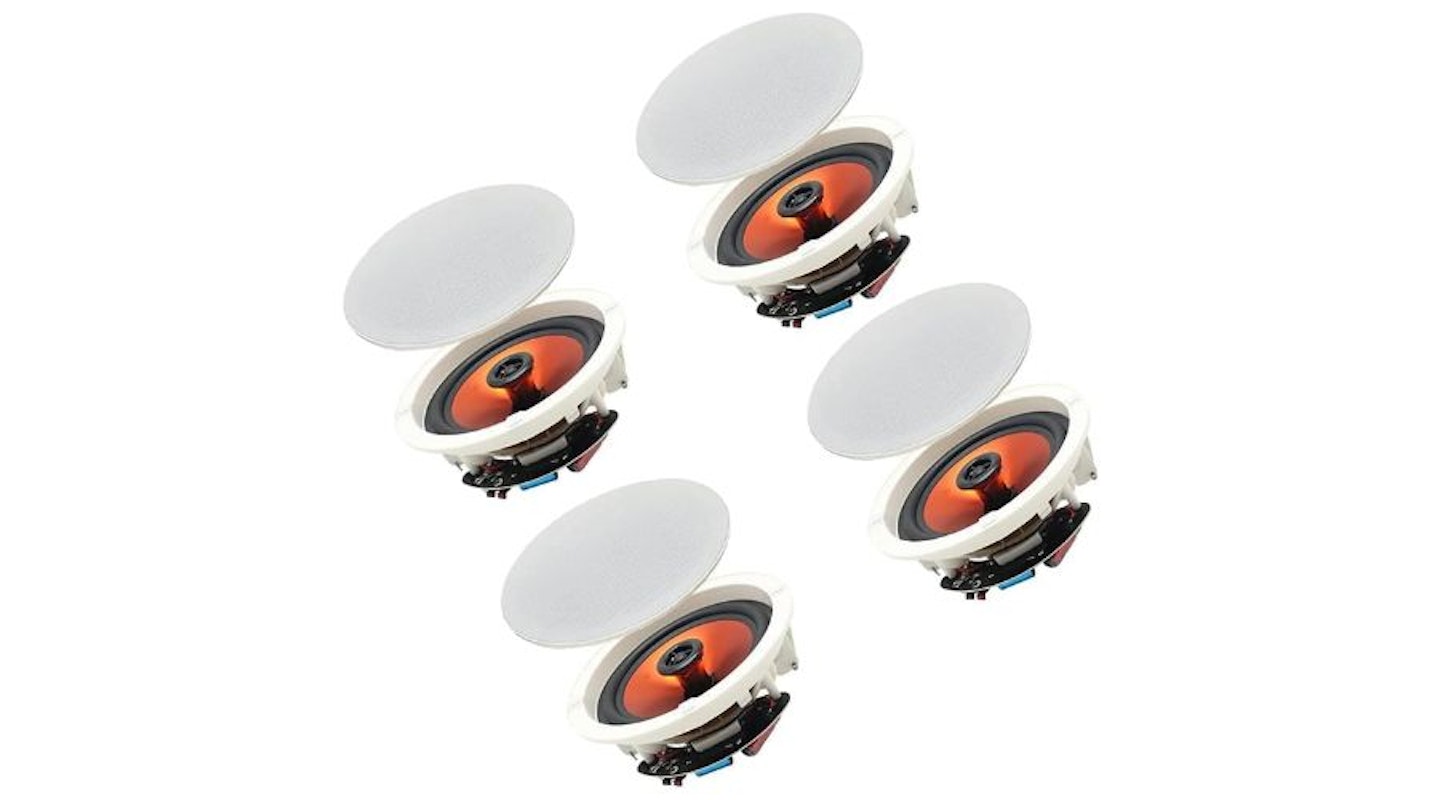 Herdio
HerdioApart from the fact that you're getting a four-speaker system here, we love that this Herdio 6.5-inch kit comes with a single Bluetooth controller that allows you to split these across two rooms. That controller will connect to your smartphone of course, but the buttons give you handy controls for volume and track skipping if you need it.
But, back to the multi-room option here. If you want all four speakers in one room that's no problem, but placing each pair in different rooms and the system will let you send different music to each set. You will need to pair two separate devices to play two sources of music, though. Audio-wise, the 6.5-inch woofers are powerful and deliver great bass, and the dome tweeters pivot for fine-tuning the sound. That said, the control unit/amp doesn't have any tone controls. So, depending on the acoustics, you may need to use an EQ app on your phone or tablet to fine-tune the sound profile. As two-room ceiling speakers go, this one has a brilliant range of features.
Pros
- A low-cost way of getting quality audio into two rooms
- Bluetooth connectivity supports two devices
- Excellent audio quality from the large cones and positionable domes here
Cons
- To get the best out of these you may need to use an EQ app on your phone
| Drivers | 6.5 inch poly woofer, 1 inch soft dome tweeter |
| Output power | 150W per channel |
| Impedance | 8 ohms |
| Frequency range | 50Hz - 20kHz |
| Active / Passive | Passive |
| Dimensions | 8 x 18 x 6.8 cm |
| Weight | 4.31 Kg |
Best Bose
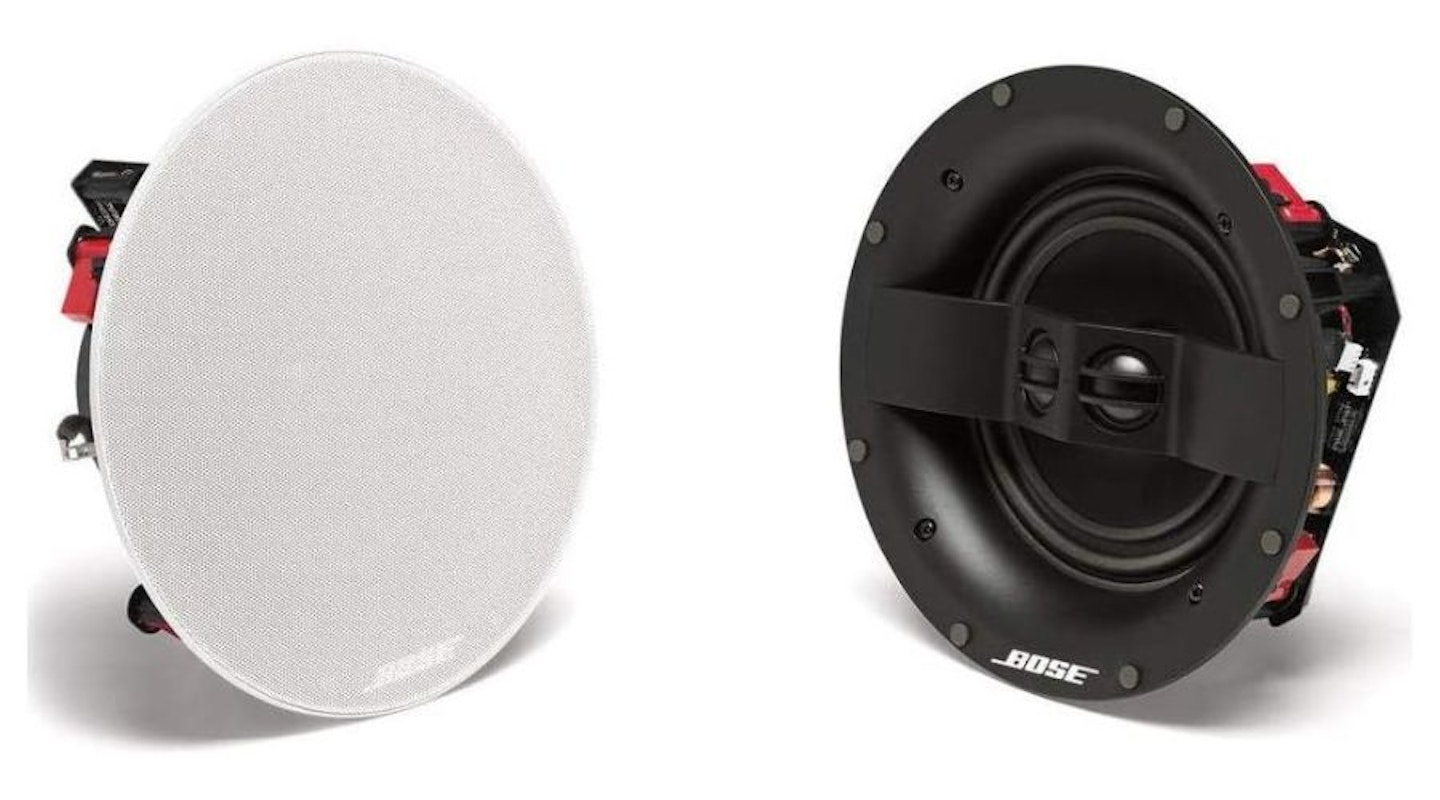 Bose/Amazon
Bose/Amazonwww.selfridges.com
When it comes to quality audio, few brands can truly go toe-to-toe with Bose, and the Bose Invisible791 in-ceiling speakers are a testament to this unwavering quality.
Brilliantly designed, gorgeously engineered and fiercely powerful, the Bose Invisible 791 speakers are designed to be as visually unobtrusive as possible, with a flat profile and subtle white mesh to camouflage on walls with ease.
Design aside, Bose's exhilarating 300W audio output is nothing short of excellent, and when paired with a fantastic amplifier, you'll never look back at your standard speaker setup again.
Pros
- Unbeatable quality and design
- Breathtaking 300W audio output
- Easy to install and perfect for a home cinema
Cons
- Quite large and therefore not suitable for small spaces
| Drivers | 1-inch x 2 tweeter, 7-inch woofer (material not specified) |
| Output power | 300W |
| Impedance | 8 ohms |
| Frequency range | 55 - 20,000 Hz |
| Active / Passive | Passive |
| Dimensions | 25.4 x 25.4 x 11.2 cm |
| Weight | 2.09 kg |
10.
Systemline E50
Best easy-to-control
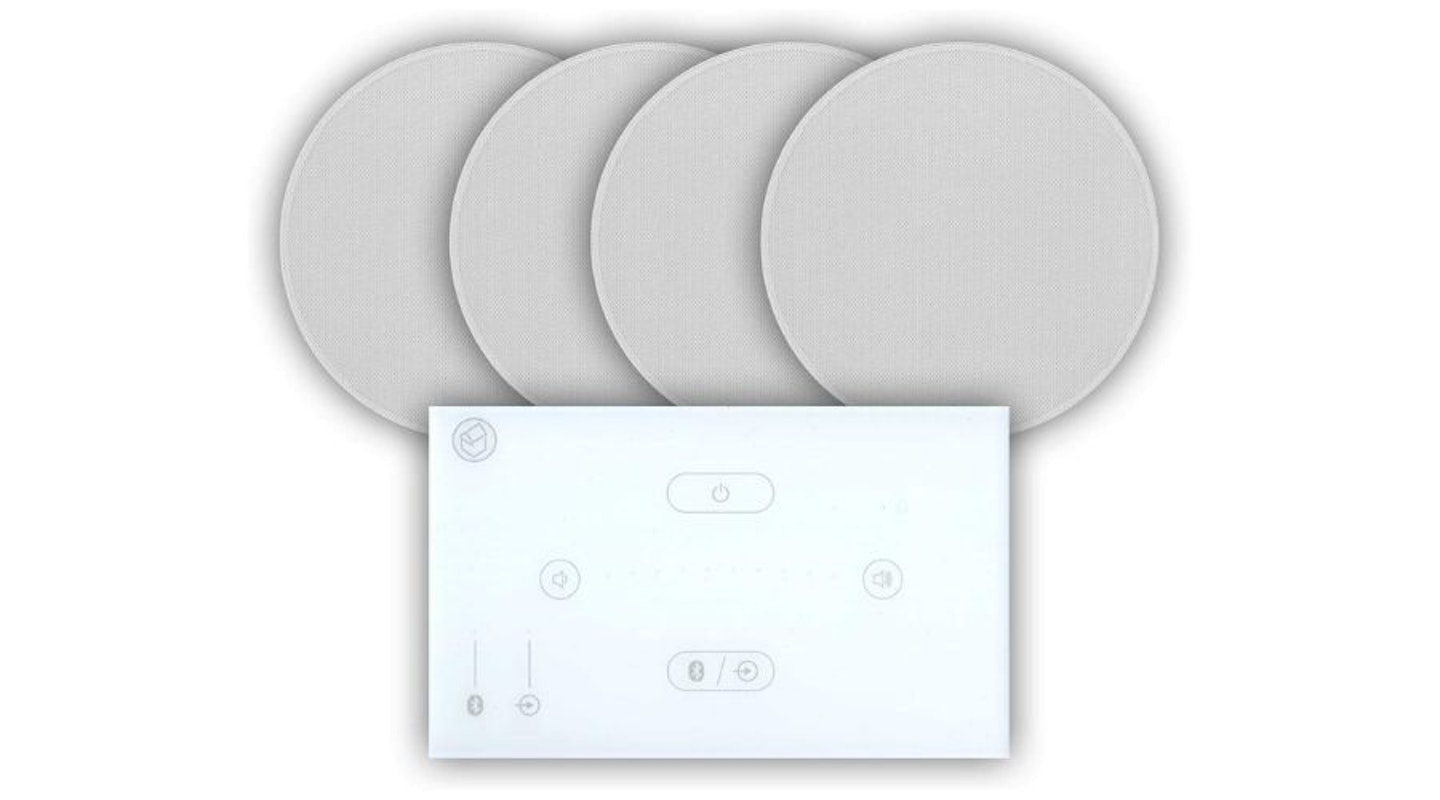 Systemline/Amazon
Systemline/AmazonIf you're all about having a sleek and active control interface to your ceiling speakers, this Systemline E50 system gives you plenty. Alongside a set of four attractive speakers, you have a wall-mounted touch and gesture control panel. Even better, it's compatible with Amazon Alexa for voice control. The speakers themselves have a minimalist design and premium build about them, - blending into any modern home.
But, back to the touch panel. We love the simple gestures for things like volume - just go clockwise for volume up, or swipe left and right for last and next track skipping. There is, of course, Bluetooth connectivity here so you're all set for wireless streaming. One great extra is the inclusion of an auxiliary input for a TV – so if you are using these as part of a home entertainment setup, you can easily connect things for surround sound. That said, some users may need to hook up an in-line equaliser for fine-tuning the bass and more.
Pros
- An excellent range of control features – from voice and Bluetooth to touch-based gestures
- A modern design for both speakers and control panel – fits into any contemporary space
- The auxiliary input is great for wired connections to TVs and other devices
Cons
- A great price for a four-speaker system with these control features, but if you want more bass for home cinema you may need to use an in-line equaliser
| Drivers | 130mm polypropylene woofer, 25mm silk dome tweeter |
| Output power | 18W per channel |
| Impedance | Not specified |
| Frequency range | 50Hz - 20kHz |
| Active / Passive | Active |
| Dimensions | 42.9 x 41.2 x 31.7 cm |
| Weight | 5.92 kg |
How to choose the best ceiling speakers for you:
Assess your room
In general, you should always choose the most practical size of speaker for your building. Depending on how your ceiling is constructed, you may struggle to house the drivers and cones inside the cavity. So, where possible, investigate your ceiling first. Then, carefully plan your wiring route and any power needs if it's an active self-powered amplified speaker system.
Secondly, choose the right number of speakers for the size of the room. Too many and you'll have wasted your money. Too few, or badly placed ceiling speakers, and you won't get any of that wonderful surround sound effect you've been hankering for.
And speaking of surround sound, that brings us to the core component of any passive ceiling speaker setup: an amplifier.
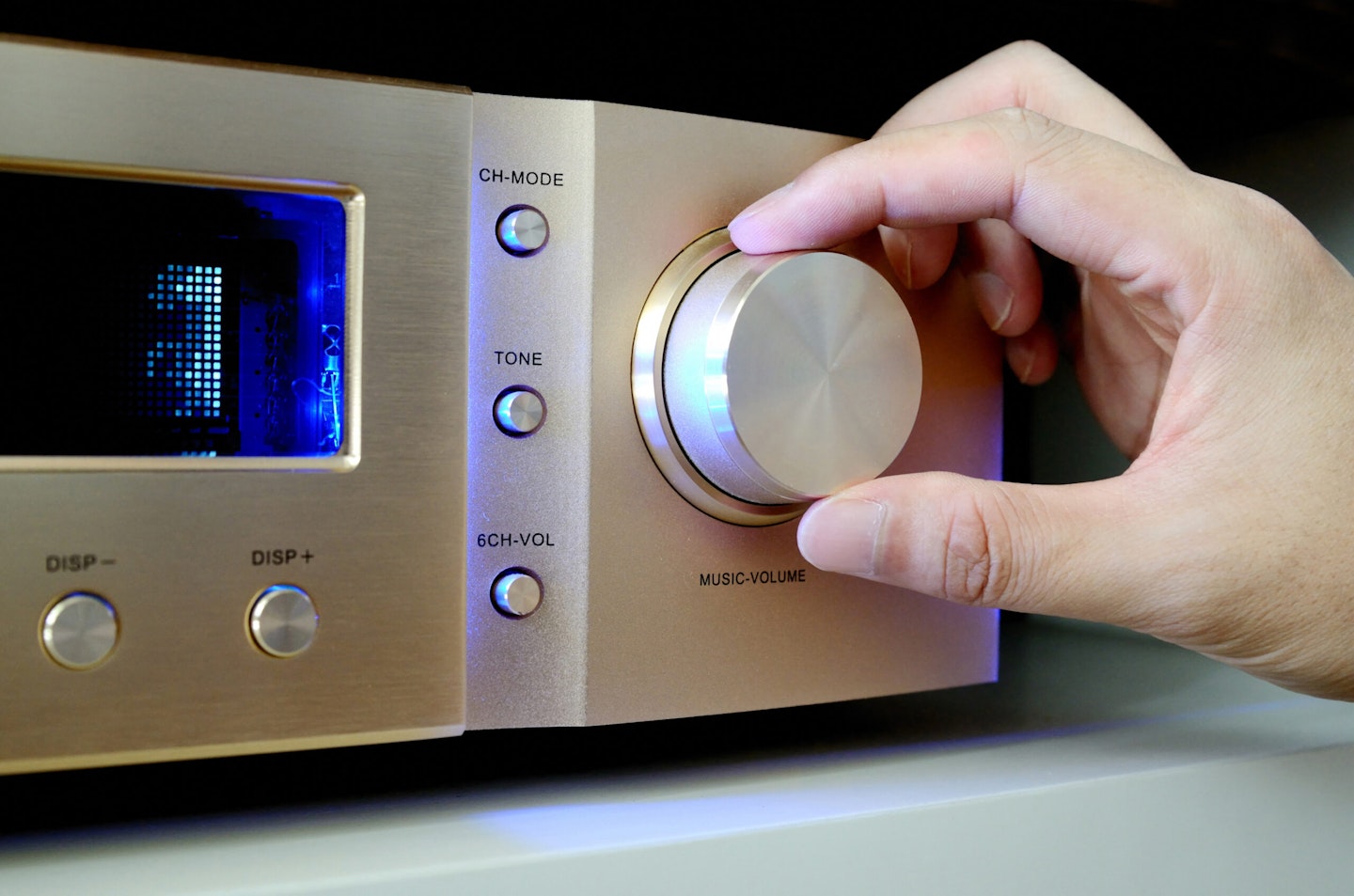
Consider your amplifier
Predictably, most ceiling speakers will require an amplifier to provide both power and an audio signal. But, if mains-powered (like the Lithe ones above) you won't need an amplifier.
There are many amplifier types, with varying degrees of power and requiring different levels of skill and know-how to use.
Speaker jargon explained
Tweeter
These small drivers take care of the higher frequencies in audio. A good quality tweeter helps carry across the details of music and audio. With ceiling speakers, tweeters are located on a stalk protruding from the centre of a subwoofer – this helps save space. They are often angled to direct audio towards listeners.
Subwoofer
These bigger drivers deliver lower frequencies in audio. They add power, drama and atmosphere to sound. Without a good subwoofer, the audio will be thin and unimpressive.
Output wattage
An amplifier processes sound and passes it through to speakers as output. Wattage is a measurement of the output signal sent to a speaker. Each speaker has a limit to the amount of wattage it can handle and pushing beyond this limit can damage the speaker. You must make sure that the output wattage of an amplifier does not exceed the output wattage rating of a speaker.
Fire Hood
You're legally required to install a fire hood. See our section on this in the FAQs.
Speaker type
There are two speaker types to consider – passive and powered. Most ceiling speakers are passive. That means they can't receive power or audio signals without being connected to an amplifier via cables. You can read more about amplifiers at the bottom of the page. Powered speakers draw their power from the main electricity supply; whereas powered speakers carry their own amplifier and connections, therefore don’t require an external amplifier.
<strong>FAQs</strong>
How good are ceiling speakers?
When you think of immersing yourself in sound, the kind of 5.1 or 7.1 speaker system you get with a surround sound home cinema setup may spring to mind. But they’re not the same. Ceiling speakers are great for delivering music of course, but they’re also an excellent addition to your home cinema setup. You can hook them up to your overhead effect channels, such as Dolby Atmos if your amp supports that.
So, if you’re all about the sound and not so much about the vision, ceiling speakers are the unobtrusive audio solution for modern uncluttered living.
Do I need a speaker cable?
Most ceiling speakers come with a length of speaker cable, allowing for a quick and easy installation. However, if you’re installing them far apart, or using multiple speakers, you will likely need to purchase an extra speaker cable.
The standard cable needed for ceiling speakers is a 16-gauge two-core cable. We recommend the GearIT 16AWG Speaker Wire. 100ft of speaker cabling from Amazon Basics costs under £20, but it’s single-core. Because a typical speaker requires two cables, this works out at only 50ft of usable length.
Note that depending on the cables provided, you may need to purchase some banana plugs.
Can I mount a ceiling speaker on a wall instead?
In most cases, yes; providing the wall cavity is deep enough to contain the speaker and cables. If you have solid walls you may decide to go for wall speakers instead. They sit snugly against the wall with a lower profile than normal wall speakers
What is a fire hood and do I need one?
A fire hood is a cover that sits in the ceiling void to cover the back of a ceiling speaker. It’s made from flame-retardant material and maintains a ceiling fire barrier rating. You're legally required to install a fire hood. This ensures the safety of yourself and others and that you maintain fire safety and building regulations.
As Smart Home Sound notes, if a fire hood is not installed, any insurance claim relating to fire damage may be rejected by an insurance provider.
You can read more about the regulation in the UK Government’s Building Regulations Fire Safety online document. Click here to view the PDF.
There are other good reasons to install a fire hood. They soundproof the back of a ceiling speaker - important if the room above is a bedroom or office. In addition, this generally improves performance, as the sound can't bleed into the cavity. A fire hood also insulates against drafts and protects the speaker from dust, debris and rodents.
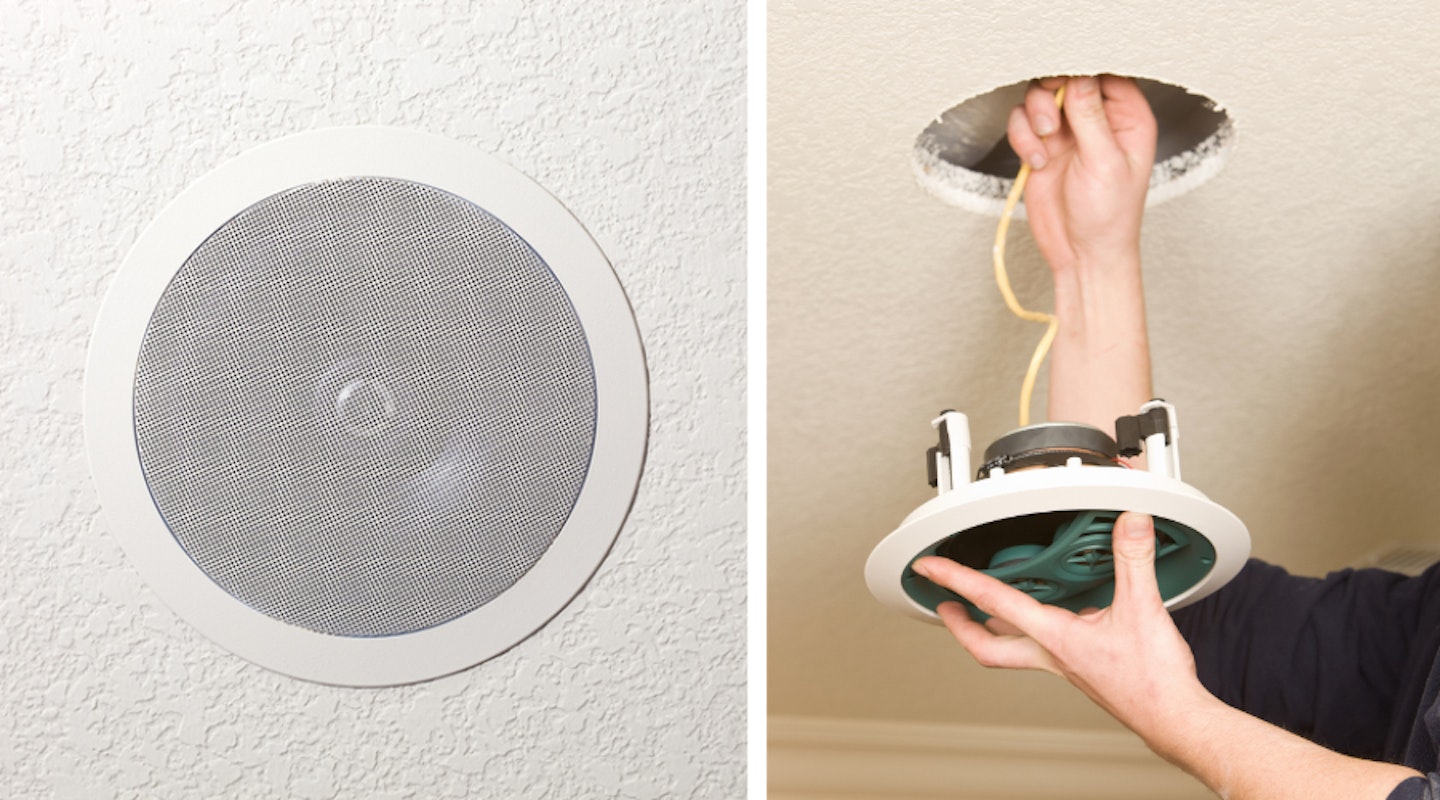
Ryan Houghton is a Tech Writer and Reviewer for What’s The Best, known best for his expertise in gaming, with a particular soft spot for PC gaming, audio tech, televisions and smartphones.
Diligently writing for What’s The Best for almost two years, there are very few tech products Ryan hasn’t had his hands on to review; televisions, headphones, folding phones and even LEGO, if it’s nerdy, he’ll be there.
His well-versed history as one of the resident techies at What’s The Best has kept him keen to uncover the very best deals, savings and offers for those in need of a cracking deal to upgrade their setup.
In his downtime, Ryan most likely has his nose buried in a fantasy book, or his eyes glued to a screen whilst playing a tough-as-nails Soulslike or leisurely RPG, indulging in most forms of escapism where possible.
Subscribe to the What’s The Best Newsletter to keep up to date with more of the latest reviews and recommendations from the rest of the What’s The Best team.
